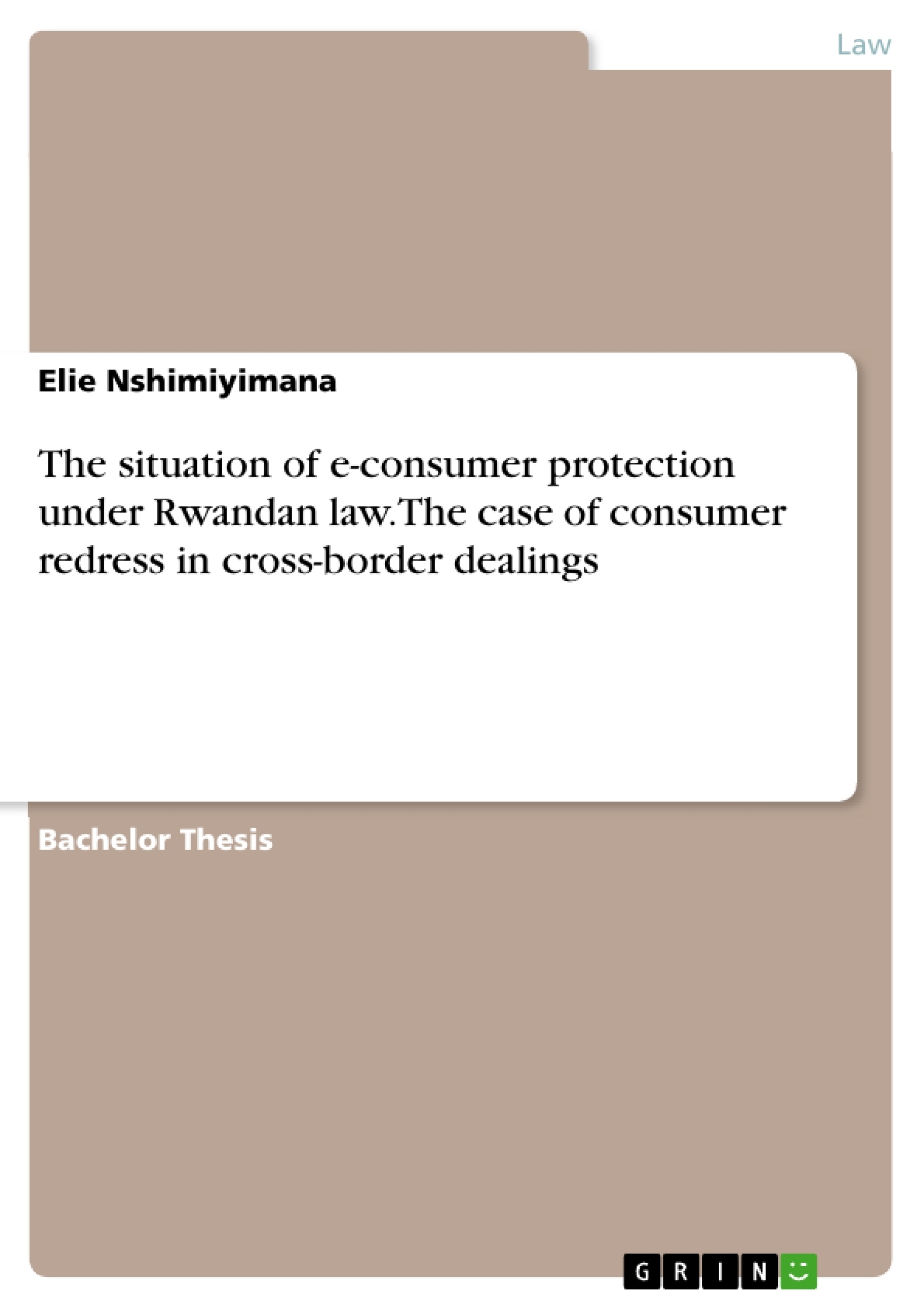In the traditional marketplace, consumers are aware of their legal rights, and it is relatively easier to get access to different methods of enforcing their rights such as through in-house complaint procedures or appealing to courts. Since every transaction is made under a single jurisdiction, redress is often available and effective. In contrast, in online transactions, access to redress is not easily reachable for consumers. Since e-commerce is borderless, the recourse to courts in disputes resulting from international electronic transactions is also complicated mostly due to the problem of knowing which courts shall have jurisdiction over such disputes.
Following the ultimate purpose of this research, the research questions to which we attempted to respond are the following: To what extent is the existing legal framework adequate to guarantee effective e-consumer redress in Rwanda? To what extent does Rwandan law address the issue of the conflict of laws and jurisdiction in case of cross-border e-commerce vis-à-vis consumer redress? What can be done to ensure or improve the effectiveness and efficiency of e-consumer redress for cross-border disputes?
This research is mostly intended to identify loopholes in Rwandan Laws with regard to issues that emerge time and again in e-commerce transactions. It specifically focuses on the availability and effectiveness of consumer redress, mechanisms thereof and institutions to put them in force. It as well tends to show failures of Rwandan Private International Rules concerning the protection of consumers, which are normally taken into account by courts while dealing with consumer-related issues consisting of a foreign element, which refers to contact with some system of law and jurisdiction other than those of the forum state.
Table of Contents
- GENERAL INTRODUCTION
- Background and interest of the research
- Research problem
- Research questions
- Research objectives
- Research methodology
- Scope of the study
- Structure of the study
- CHAPTER I: CURRENT LEGAL FRAMEWORK OF E-CONSUMER REDRESS IN RWANDA
- PORTRAYAL OF E-CONSUMER REDRESS
- LEGAL FRAMEWORK OF E-CONSUMER REDRESS IN RWANDA
- COMPETITION AND CONSUMER PROTECTION LAW
- OTHER AUTHORITIES
- MECHANISMS
- ASSESSMENT OF THE SUITABILITY AND ADEQUACY OF EXISTING REDRESS
- CHAPTER II: THE RELIEF OF RWANDAN PRIVATE INTERNATIONAL LAW TO THE CONFLICTS OF LAWS AND JURISDICTIONS ARISING FROM CROSS-BORDER E-COMMERCE
- CONFLICT OF LAWS
- CONFLICT OF JURISDICTIONS
- PANACEA OF RWANDAN PRIVATE INTERNATIONAL RULES FOR JURISDICTIONAL ISSUES
- ASSESSMENT OF THE ADEQUACY OF RWANDAN JURISDICTIONAL RULES
Objectives and Key Themes
This dissertation analyzes the situation of e-consumer protection under Rwandan law, particularly focusing on the challenges of consumer redress in cross-border dealings. The main objective is to assess the adequacy and suitability of existing legal frameworks and mechanisms for resolving e-commerce disputes involving Rwandan consumers.
- The legal framework for e-consumer protection in Rwanda
- The effectiveness of existing redress mechanisms for e-commerce disputes
- The impact of cross-border e-commerce on consumer rights
- The application of Rwandan private international law to conflicts of laws and jurisdictions arising from cross-border e-commerce
- The potential for alternative dispute resolution (ADR) in resolving e-commerce disputes
Chapter Summaries
Chapter I provides a comprehensive overview of the legal framework governing e-consumer redress in Rwanda. It examines the Competition and Consumer Protection Law (LCCP) and other relevant authorities, highlighting the mechanisms available for consumers to seek redress. This chapter also analyzes the adequacy of existing mechanisms in addressing the specific challenges of e-commerce disputes.
Chapter II explores the application of Rwandan private international law to conflicts of laws and jurisdictions arising from cross-border e-commerce. This chapter analyzes the rules governing choice of law and jurisdiction, highlighting their relevance to e-commerce transactions. It also assesses the efficacy of these rules in resolving disputes involving Rwandan consumers in cross-border e-commerce scenarios.
Keywords
This dissertation focuses on e-consumer protection, cross-border e-commerce, consumer redress, dispute resolution, Rwandan law, private international law, choice of law, jurisdiction, competition and consumer protection, alternative dispute resolution (ADR), and online dispute resolution (ODR).
- Citar trabajo
- Elie Nshimiyimana (Autor), 2019, The situation of e-consumer protection under Rwandan law. The case of consumer redress in cross-border dealings, Múnich, GRIN Verlag, https://www.grin.com/document/535275



